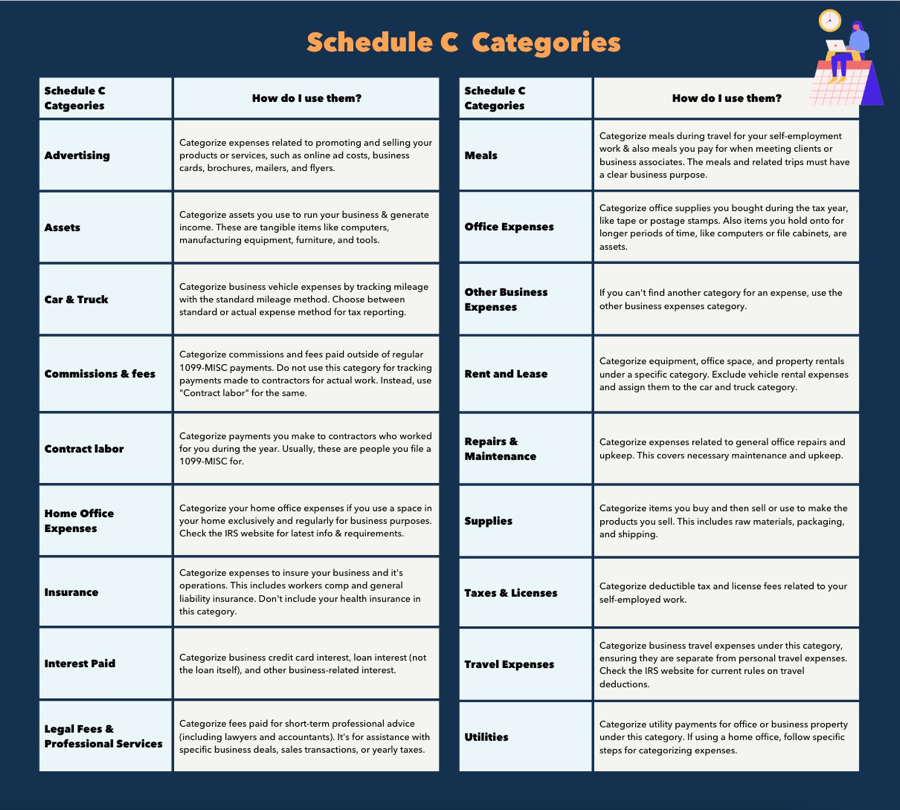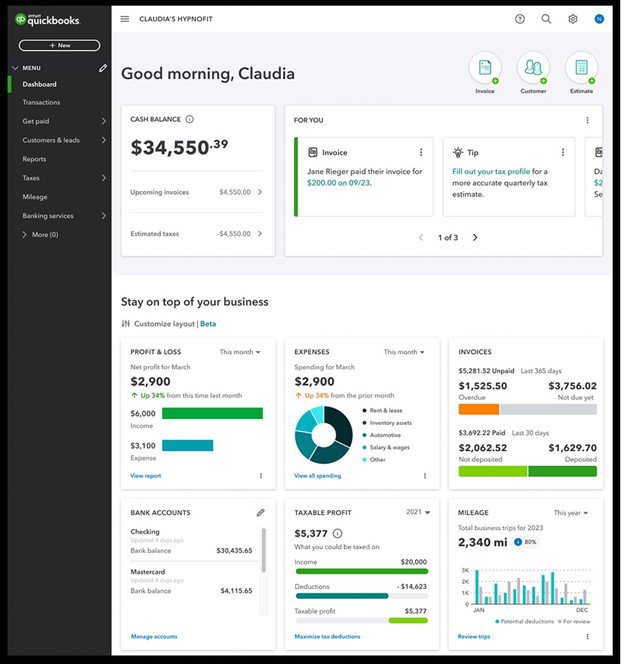Are you a solopreneur trying to find the perfect tool to manage your finances? Or perhaps you’re a small business owner looking for an easy start to tackle your accounting needs?
You’re in the right place. Choosing between QuickBooks Solopreneur and Simple Start can be a game-changer for your business. This decision can affect how you spend your time, your productivity, and ultimately, your success. Imagine having a tool that not only saves you time but also gives you peace of mind knowing your finances are in good hands.
You deserve software that makes accounting easy, freeing up your mental bandwidth for what truly matters – growing your business. We’ll dive into the specifics of QuickBooks Solopreneur vs Simple Start. We’ll help you understand which option aligns better with your goals, and ensure you make the best choice for your unique needs. Don’t miss out on finding the perfect fit that could transform your business journey. Stay tuned!

Credit: quickbooks.intuit.com
Comparing Features
Choosing the right accounting software is crucial for solopreneurs. QuickBooks offers two popular options: Solopreneur and Simple Start. Each has unique features that cater to different needs. Understanding these features helps in making informed decisions. Let’s dive into the comparison of these two versions.
Dashboard Interface
The dashboard is the heart of any software. QuickBooks Solopreneur offers a simplified interface. It’s designed for those who want straightforward navigation. Icons and tools are easy to find and use. On the other hand, Simple Start provides a more detailed dashboard. It offers a wide range of options for customization. This allows users to tailor the interface to their liking. Both dashboards aim to enhance user experience.
Expense Tracking
Effective expense tracking is vital for managing finances. Solopreneur provides basic expense tracking. It is perfect for those with simple financial needs. Users can easily log and categorize expenses. Simple Start offers advanced features for tracking. It includes automatic bank feeds and detailed expense reports. This helps in better understanding spending patterns. Both versions ensure accurate and efficient tracking.
Invoicing Capabilities
Sending invoices efficiently is crucial for business operations. Solopreneur offers basic invoicing features. It allows users to create and send invoices quickly. Simple Start takes it a step further. It provides templates and automation options. Users can customize invoices to suit their brand. This makes invoicing a seamless process. Both versions support timely payments.
Reporting Functions
Reports offer insights into business performance. Solopreneur provides essential reporting functions. Users can generate basic reports for income and expenses. Simple Start offers detailed reporting capabilities. It includes cash flow and profit analysis reports. Users can access in-depth financial insights. Both versions aim to improve decision-making through reports.

Credit: insightfulaccountant.com
Pricing Differences
Understanding the cost of accounting software is crucial for small business owners. QuickBooks offers different plans, including Solopreneur and Simple Start. Each plan has its own pricing structure, designed to suit various business needs. This section explores the pricing differences between these two plans.
Cost Analysis
The QuickBooks Solopreneur plan is tailored for individual entrepreneurs. It comes with a specific monthly fee, making budgeting predictable. In contrast, the Simple Start plan offers basic features at a lower price. This makes it ideal for those beginning their business journey.
Both plans require a monthly subscription. Solopreneur includes more advanced features than Simple Start. This difference reflects in their pricing. The higher cost of Solopreneur provides more comprehensive tools. Simple Start remains a cost-effective option for new businesses.
Value For Money
Value for money is a key consideration when choosing software. The Solopreneur plan offers extensive tools for detailed financial management. This is beneficial for those who need advanced reporting and insights. Its higher price is justified by its robust features.
Simple Start offers essential tools for basic accounting needs. It suits those who need straightforward financial tracking. Its lower price point offers good value for small-scale operations. Both plans provide value but cater to different user needs.
User Experience
When choosing between QuickBooks Solopreneur and Simple Start, understanding their user experience is crucial. The software you use should feel intuitive and be easy to navigate, especially when you’re juggling multiple responsibilities. Your experience can shape how efficiently you manage your finances and keep your business running smoothly.
Ease Of Use
QuickBooks Solopreneur is tailored for individuals managing everything independently. Its interface is clean and straightforward, allowing you to focus on tasks without unnecessary distractions. You can quickly find features you need and complete tasks with minimal clicks.
Simple Start, on the other hand, is designed with beginners in mind. It offers a guided setup that walks you through essential steps. This is perfect if you’re new to accounting software and need a little hand-holding to get started. However, some users might find this guided approach a bit restrictive as they become more experienced.
Think about how you prefer to work. Do you enjoy having more control, or do you need guidance to avoid feeling overwhelmed? Your choice should reflect your comfort level with technology.
Customer Support
Imagine encountering a technical glitch right before a major deadline. QuickBooks Solopreneur offers robust support options, including live chat and phone support. You can reach out to a real person who understands the challenges of running a solo business.
Simple Start provides comprehensive online resources, including tutorials and forums. These can be invaluable for troubleshooting at your own pace. However, the lack of real-time support might be a drawback if you’re facing urgent issues.
Consider how important immediate assistance is for you. Are you comfortable searching for solutions online, or do you prefer speaking directly with support staff? Your choice might depend on how you handle unexpected challenges.
Ultimately, your user experience with QuickBooks Solopreneur or Simple Start will depend on your individual needs and preferences. Which aspects of user experience matter most to you? Choose the software that aligns with your style and empowers you to manage your business with confidence.
Target Audience
Deciding between QuickBooks Solopreneur and Simple Start can feel like choosing between two equally appealing dishes on a menu. They both serve the purpose of managing finances, but their ideal users are quite distinct. Let’s dive into who should consider each option, helping you make the right choice without spending unnecessary time or money.
Who Should Choose Solopreneur?
QuickBooks Solopreneur is perfect for the independent professional who wears many hats. If you’re a freelancer, consultant, or a sole proprietor, this is tailored for you.
Imagine you’re a graphic designer juggling multiple projects. Solopreneur offers a streamlined way to manage invoices, track expenses, and keep tabs on your cash flow—all from a single platform.
This version understands the specific needs of a one-person business. It offers features that are straightforward, eliminating the clutter you don’t need. Are you someone who likes to keep things simple and direct? Then Solopreneur might just be your perfect match.
Who Should Choose Simple Start?
Simple Start is aimed at small business owners who are beginning their accounting journey. If you’re looking to grow your business with a small team, Simple Start can give you the foundation you need.
Imagine running a small boutique with a couple of employees. Simple Start helps you manage your business finances, track income, and run basic reports.
It’s designed to handle more than just solo operations, making it ideal for those who plan on expanding. Are you in the initial stages of scaling your business? Simple Start can provide the support you need without overwhelming you with features you’re not ready for yet.
Choosing between Solopreneur and Simple Start is all about understanding where you are in your business journey. Which path aligns with your current needs and future plans?
Integration Capabilities
Understanding the integration capabilities of QuickBooks Solopreneur and Simple Start can significantly impact your financial management efficiency. Imagine smoothly connecting your accounting software with other business tools you use daily. But how do these two compare when it comes to integration? Let’s dive into their compatibility with third-party apps and data import options.
Third-party Apps
Both QuickBooks Solopreneur and Simple Start offer robust integration with third-party apps. You’re not limited to just accounting features; you can expand your toolkit. Solopreneur allows seamless integration with popular apps like PayPal and Shopify. This means you can track your sales and expenses without switching platforms.
Simple Start, while offering fewer integrations, still connects with essential apps like Square and Etsy. If you’re running a small shop or freelancing, these integrations are vital for handling transactions and managing inventory. Which apps do you wish your accounting tool integrated with?
Data Import Options
Importing data can be a daunting task, but QuickBooks makes it easier. Solopreneur offers more flexibility in importing data from various sources. Whether it’s spreadsheets or bank statements, you can quickly bring in your financial data. This is a lifesaver if you’re transitioning from another accounting software.
Simple Start provides basic data import options but is more suited for beginners. It allows you to import customer lists and sales data but may require manual adjustments. If you value ease and simplicity in importing data, Simple Start may be the right choice. How much time do you spend manually entering data? Wouldn’t it be amazing to automate that process?
When choosing between QuickBooks Solopreneur and Simple Start, consider your integration needs. The choice could streamline your business operations and give you more time to focus on what you love doing. Are you ready to enhance your accounting experience?
Scalability
Choosing between QuickBooks Solopreneur and Simple Start affects scalability for small businesses. Solopreneur caters to individual entrepreneurs, offering personalized tools. Simple Start suits those planning growth, providing a straightforward platform for expanding needs. Each option supports different business stages, ensuring efficient management.
Scalability is a crucial factor when choosing the right accounting software for your business. As a solopreneur, you might start with minimal needs, but what happens when your business begins to grow? You need a solution that can grow with you, adapting to the changing demands of your enterprise. Let’s explore how QuickBooks Solopreneur and Simple Start stack up in terms of scalability.Growth Potential
Choosing software with growth potential is like planting a seed for your business future. QuickBooks Solopreneur is tailored for those flying solo, providing essential features without overwhelming complexity. However, as your business expands, you may find its capabilities limited. Simple Start, on the other hand, offers a bit more room for growth. It supports basic invoicing and expense tracking, but also has the capability to handle sales tax and generate reports. It’s designed with the foresight that your business might need more robust features as it scales. Have you considered where your business will be in two years? The software you choose should be able to grow with you, not hold you back.Future Needs
Planning for future needs is essential when selecting accounting software. QuickBooks Solopreneur is perfect for those who need a straightforward tool to manage day-to-day finances. Yet, it may fall short when you start hiring or dealing with more complex transactions. Simple Start can serve as a stepping stone to more advanced QuickBooks versions. As your business grows, you can easily upgrade to versions that offer payroll management, inventory tracking, and advanced reporting. This flexibility can save you the hassle of switching software entirely. Imagine trying to transition to a new system amidst a hectic growth phase. Choosing a scalable solution now can save you time and stress later. How do you envision your business evolving, and can your current tools keep pace with that vision? In essence, scalability isn’t just about where you are now. It’s about where you want to be and having the right tools to get there. Choose wisely, and your accounting software will not only meet your current needs but also support your journey to success.Pros And Cons
Choosing the right accounting software can be challenging for small business owners. QuickBooks offers two popular options: Solopreneur and Simple Start. Both cater to different needs. Understanding their pros and cons can guide your decision.
Solopreneur Advantages And Disadvantages
Solopreneur is tailored for one-person businesses. Its advantages include a user-friendly interface. This makes navigation easy. It offers essential tools for invoicing and expense tracking. These features help manage finances efficiently. Integration with third-party apps enhances functionality.
Despite its benefits, Solopreneur has limitations. It lacks advanced reporting features. This may hinder detailed financial analysis. The software also limits users to one. This could be restrictive for growing businesses. Another disadvantage is the absence of payroll features. This requires separate solutions for employee payments.
Simple Start Advantages And Disadvantages
Simple Start is ideal for small businesses starting out. It provides a comprehensive overview of finances. Users can access basic reports to track income and expenses. The software supports multiple users, promoting collaboration. It includes essential features like invoicing and sales tracking.
Yet, Simple Start has its downsides. It does not include inventory management. Businesses with stock may find this limiting. The software lacks advanced customization options. This may not suit those needing tailored reports. Payroll features are also missing. This necessitates additional software for payroll management.
User Testimonials
User testimonials provide insightful perspectives from individuals who use Quickbooks. They help others make informed decisions about which version suits their needs. This section showcases experiences from users of Quickbooks Solopreneur and Simple Start. These stories highlight the strengths and challenges of each version, allowing potential customers to see real-world applications.
Solopreneur User Experiences
Users of Quickbooks Solopreneur appreciate its tailored features for single-person businesses. Many find the interface intuitive and easy to navigate. One user expressed satisfaction with how it tracks expenses effortlessly. Another user mentioned that the invoicing feature saved time and minimized errors. The simplicity of Solopreneur helps users focus on their business without technical distractions. Some users wish for more advanced reporting features. Yet, they commend its efficiency in managing daily finances.
Simple Start User Experiences
Simple Start users often highlight its straightforward setup process. One user praised its ability to sync with bank accounts seamlessly. Many enjoy the clean layout and easy access to essential tools. One testimonial noted its effectiveness in organizing finances for small businesses. Users often appreciate its affordable price point compared to other products. Some desire more customization options for reports. Despite this, they value its reliability in managing basic accounting tasks.

Credit: www.tryfondo.com
Frequently Asked Questions
What Is The Difference Between Quickbooks Simple Start And Quickbooks Solopreneur?
QuickBooks Simple Start is designed for small businesses needing basic accounting features. QuickBooks Solopreneur caters to individual entrepreneurs, offering tools tailored to single-person businesses. Both help track expenses and manage finances, but Solopreneur provides more personalized options for solo business owners.
Is Quickbooks Solopreneur Worth It?
QuickBooks Solopreneur is ideal for managing finances efficiently. It offers simple invoicing, expense tracking, and tax management. Designed for small businesses, it saves time and boosts productivity. The intuitive interface ensures ease of use. Many solopreneurs find it beneficial for streamlining operations and maintaining financial health.
Is Quickbooks Solopreneur Replacing Self-employed?
QuickBooks Solopreneur is not replacing QuickBooks Self-Employed. It serves as an additional offering for individual entrepreneurs, providing tailored features to manage finances effectively. Both tools cater to different needs, allowing users to choose the best fit for their business requirements.
Conclusion
Choosing between QuickBooks Solopreneur and Simple Start? Think about your needs. Solopreneur is great for individual business owners. It offers tailored features for freelancers. Simple Start is perfect for new businesses. It provides essential tools for growth. Both options are user-friendly and reliable.
Assess your goals and budget carefully. Determine which features matter most. Each version caters to different business stages. Make sure to choose wisely for your success. Remember, effective financial management helps your business thrive. Stay informed and make the best choice for your unique situation.


